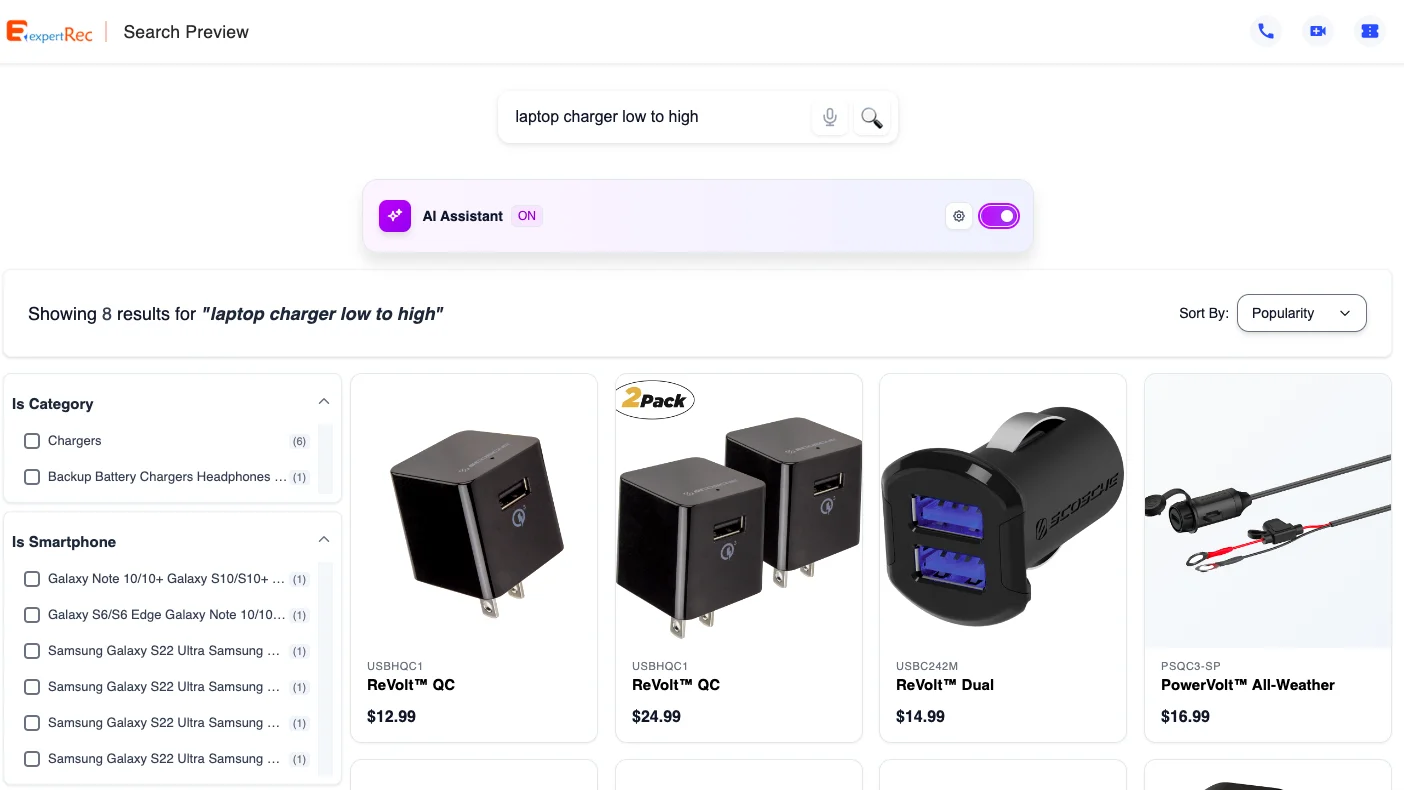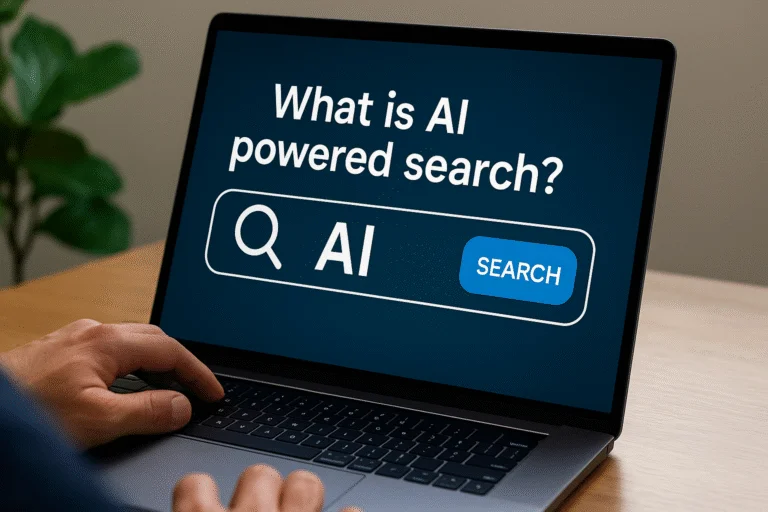The rapid growth of digital content has made traditional search systems inadequate. Whether it’s ecommerce, knowledge management, or customer support, users now expect faster, smarter, and more relevant results. This is where AI-powered search comes into play.
By leveraging artificial intelligence techniques like machine learning, natural language processing (NLP), and semantic analysis, AI-powered search engines deliver results based on intent rather than just keyword matching. These systems can understand synonyms, context, user behavior, and even images—making them far superior to traditional keyword-based search engines.
In this blog, we will explore what AI-powered search is, how it works, whether it’s worth using, possible alternatives, and how Expertrec offers an advanced AI-powered search solution to enhance digital experiences and boost business outcomes.
What is AI-Powered Search?
AI-powered search refers to search systems that use artificial intelligence techniques to improve the accuracy, relevance, and personalization of search results. Unlike traditional search engines that rely on exact keyword matches, AI search engines analyze:
-
User intent and behavior
-
Query semantics
-
Contextual data
-
Historical interactions
These systems can understand complex queries like “shoes under ₹1000 for trekking in monsoon” or even visual inputs such as product images. AI search mimics how a human might interpret and respond to a query—not just by matching words, but by understanding meaning.

Core Technologies Behind AI Search
To understand how AI-powered search works, let’s break down its core technologies:
1. Natural Language Processing (NLP)
NLP helps the system interpret human language in queries. It allows the engine to understand grammatical structure, synonyms, spelling variations, and even slang.
2. Machine Learning (ML)
ML models learn from user interactions, click-throughs, and conversions to improve future search relevance. These models adapt over time, continuously refining the ranking logic.
3. Semantic Search
Semantic search focuses on meaning rather than keywords. It uses vector representations of words and queries to measure similarity between the user query and indexed documents/products.
4. Personalization Engines
AI search engines tailor results for each user based on browsing history, preferences, purchase history, and demographic data.
5. Image and Voice Recognition
Some AI search engines support visual search (uploading an image instead of typing a query) and voice search(natural speech inputs).
Use Cases of AI-Powered Search
AI-powered search is valuable in various digital environments:
Ecommerce: Improves product discovery, boosts conversions, and reduces bounce rates.
Knowledge bases: Enables employees or customers to find documentation and resources faster.
Customer support: Integrates with chatbots and support portals to serve relevant answers
Media platforms: Enhances content discovery with personalized results.
Enterprise search: Allows employees to search internal documents, emails, and systems intelligently.
Is AI-Powered Search Worth Using?
Absolutely. The benefits of AI search go far beyond basic functionality. Let’s explore the key advantages:
1. Improved Relevance and Accuracy
AI delivers more meaningful results, especially for long-tail and conversational queries. This reduces frustration and increases engagement.
2. Higher Conversion Rates
In ecommerce, relevant search results directly lead to more purchases. AI-based recommendations and dynamic filtering increase average order value (AOV).
3. Enhanced User Experience
AI adapts to each user’s context and behavior, offering a more intuitive and personalized experience.
4. Operational Efficiency
AI reduces the need for manual search tuning, synonym configuration, and merchandising logic—saving time and resources.
5. Scalability
As your product catalog or content library grows, AI scales effortlessly, indexing and understanding new data in real time.
Are There Better Alternatives to AI-Powered Search?
Traditional keyword-based search systems (like Elasticsearch or basic platform search in Shopify or Magento) are still widely used. However, they have limitations:
| Feature | Traditional Search | AI-Powered Search |
|---|---|---|
| Keyword Matching | Exact only | Context-aware |
| Learning from Users | No | Yes |
| Multilingual Support | Basic | Advanced |
| Visual/Voice Input | Not Supported | Supported |
| Personalization | Limited | Deep |
| Relevance Ranking | Manual | Automatic |
The real alternative is AI search platforms with lower integration effort, cost-effective pricing, and no-code deployment. This is where Expertrec stands out as an ideal solution.
How Expertrec Powers AI-Driven Search Experiences
Expertrec offers a robust, AI-powered search engine that is easy to integrate, fast to deploy, and designed for both small businesses and large enterprises.
Here’s how Expertrec brings AI search to life:
✅ Natural Language Query Handling
Expertrec interprets user queries using NLP, accounting for word order, synonyms, spelling mistakes, and more.
✅ Intent-Based Ranking
Its machine learning models learn from user behavior to display the most relevant results, not just the most obvious matches.
✅ Semantic Search & Vector Embeddings
Expertrec uses vector-based indexing to understand contextual meaning, enabling smarter product or document matching.
✅ Personalized Search Results
Results adapt based on user history, preferences, and behavior, improving relevance over time.
✅ Multilingual and Voice Support
Expertrec supports multilingual content and allows users to search using natural voice input.
✅ Real-Time Indexing & Fast Performance
With blazing-fast indexing and minimal latency, Expertrec ensures users always see updated and responsive search results.
✅ Visual Search Integration
Users can search using images—perfect for fashion, furniture, and lifestyle ecommerce stores.
Technical Benefits of Choosing Expertrec
No-Code/Low-Code Integration: Easily deploy with a few lines of script or SDKs on any platform including Shopify, Magento, WooCommerce, and custom CMS.
Customizable UI: Tailor the search bar, result layout, filters, and ranking logic without backend development.
Analytics Dashboard: Track search performance, query volume, no-result queries, and user behavior.
Scalable Architecture: Designed to handle large catalogs and high query volumes with high availability.
Final Thoughts
AI-powered search is no longer a luxury—it’s a necessity for digital platforms aiming to provide superior search and discovery experiences. Whether you’re running an ecommerce store, managing a knowledge base, or building a support portal, switching to AI search significantly boosts user satisfaction, engagement, and conversion rates.
Expertrec simplifies the process of implementing AI-powered search. With its quick setup, affordable pricing, and powerful features, it offers a compelling solution for businesses that want to stay competitive in a digital-first world.
By adopting Expertrec, you’re not just upgrading your search engine—you’re investing in a smarter, more intuitive user experience that directly impacts your bottom line.
FAQs
AI-powered search uses artificial intelligence technologies like NLP and machine learning to deliver more relevant, personalized, and intelligent search results.
2. How is it different from traditional search?
Unlike traditional keyword-based search, AI-powered search understands context, user intent, and behavior to return more accurate results.
3. Does Expertrec support multilingual and voice-based search?
Yes, Expertrec supports multilingual content and allows users to search using voice input for better accessibility.
4. Can I integrate Expertrec into Shopify or Magento?
Yes. Expertrec offers native integrations and plugins for Shopify, Magento, WooCommerce, and other platforms.
5. Is coding required to implement Expertrec AI search?
No. Expertrec offers a no-code dashboard and provides a simple script or plugin to get started in minutes.
6. How does Expertrec improve ecommerce search?
Expertrec uses AI to enhance product discovery through semantic understanding, personalized ranking, and visual/voice search capabilities.




